#paul yates
Text

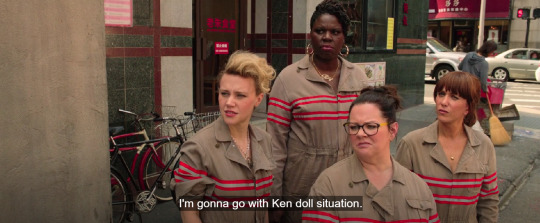
Weird Barbie's foreshadowing
#Paul Feig#ghostbusters#Leslie Jones#patty tolan#Kate McKinnon#Jillian Holtzmann#Melissa McCarthy#abby yates#Kristen Wiig#Erin Gilbert#//#sine's edits
59 notes
·
View notes
Text
'On a recent winter day in New York when the sun was shining, Andrew Scott rushed into a coffee shop between recording sessions for an upcoming series.
“I’m scheduled tighter than a teenage pop star,” he said, beaming.
The interview had been postponed once, and the location was switched at the last minute to save Scott some time in traffic. But he sat down fully engaged and eager to start talking. Immediately, though, a passerby tapped on the storefront glass and asked for a photo. Scott, without a grumble, sprinted out to oblige, even though the gesture seemed more like a command (“You’re under arrest,” joked Scott) than a polite request.
Scott, the 47-year-old Irish actor, is in demand like never before. That’s partly due to accrued good will. A regular presence on stage in the West End, Scott is known to many as the “Hot Priest” of “Fleabag” or the cunning Moriarty of “Sherlock.” Soon, he’ll play Tom Ripley in the Netflix series “Ripley,” adapted from the Patricia Highsmith novel.
But the real reason Scott’s time is short right now is Andrew Haigh’s new film, “All of Us Strangers.” In it, Scott plays a screenwriter working on a script about his childhood. The film is gently poised in a metaphysical realm; when Adam (Scott) returns to his childhood home, he finds his parents (Claire Foy, Jamie Bell) as they were before they died many years earlier.
At the same time, the movie, loosely adapted from Taichi Yamada’s 1987 book “Strangers,” balances a budding romance with a neighbor ( Paul Mescal ), a relationship that unfolds with profound reverberations of family, intimacy and queer life. In a dreamy, longing ghost story, Scott is its aching, shimmering soul.
“The challenge of it was to try to go to that place but not gild the lily too much,” Scott says. “As an actor, I have to be in touch with that playful side of myself and that part of you that’s childish. I was actually quite struck by how vulnerable I looked in the film.”
Scott’s acutely tender performance has made him a contender for the Academy Awards. He was named best actor by the National Society of Film Critics. At the Golden Globes on Sunday (Scott wore a white tux and t-shirt), he was nominated for best actor in a drama.
Scott has long admired actors like Anthony Hopkins, Judi Dench and Meryl Streep — performers with a sense of humor who, he says, “are able to understand what you feel and what you present.” Scott, too, is often funny on screen (see Lena Dunham’s medieval romp “Catherine Called Birdy” ). And even in quiet moments, he seems to be buzzing inside at some discreet frequency. Something is always going on under the surface.
He’s been acting since he was young; drama classes were initially a way to get over shyness. Scott’s first film role came at age 17. He has often spoken about seeking to maintain a childlike perspective in acting. In that way, “All of Us Strangers” is particularly fitting. On Adam’s trips home, he sort of morphs back into the child he was. In one scene, he wears his old pajamas and crawls into bed with his parents.
“So many of the things that are required of you as an actor are a sense of humor and some ability to be able to put yourself in a situation. Because it’s all down to imagination,” says Scott. “For me, that’s the thing you need to keep. That’s the thing — because I started out when I was young — I don’t want to move too far away from. Like when kids go, ‘OK, you be this and I’ll be this.’ That ability doesn’t leave us. What does leave us is a lack of self-consciousness. Our job is to hold on to that.”
Haigh, the British filmmaker of “45 Years” and “Weekend,” began thinking of Scott for the role early on. They met and talked through the script for a few hours.
“He’s a similar generation to me. He’s a tiny bit younger than me, but he’s from the same generation,” says Haigh. “He understands that experience.”
Scott came out publicly in 2013, but his natural inclination is to be private. “I feel like I’ve given so much of myself in the film, you think you don’t want to give it all away,” he says. He describes “All of Us Strangers” — which Haigh shot partly in his childhood home — as personal, but not autobiographical in its depiction of the alienation that can linger after coming out.
“Mercifully, I feel very comfortable for the most part. But it stays with you that pain, and it actually makes you more compassionate, I think. Because we shot in Andrew’s childhood home, that sort of threw down the gauntlet in relation to how much of his own personality he was giving,” says Scott. “I wanted it to be sort of unadorned, unarmored and raw. That’s why I think there’s such tenderness in the film.”
Scott has sometimes recoiled from how sexuality is talked about the media and in Hollywood. He recently said the phrase “openly gay” should be done away with. As of late December, Scott hadn’t yet watched “All of Us Strangers” with his parents, though he planned to.
“The best way to express it is to say I’ll be very sensitive to how they watch it and how they feel about it, and how it makes me feel them watching it,” Scott says.
The tenderness in the film is also owed in part to Scott’s chemistry with Mescal. On-screen chemistry is an amorphous quality that the film industry has long tried to turn into a science with camera tests and marketing that flirts with real-life romance.
But for Scott, it’s something different. He and Phoebe Waller-Bridge had chemistry, overwhelmingly, in “Fleabag,” but that didn’t have anything to do with sexual attraction. Pinpointing that quality is something Scott pondered during Simon Stephens and Sam Yates’ recent staging of Chekhov’s “Uncle Vanya” at the National Theater. Scott played all eight roles, meaning he essentially had to have chemistry with himself.
“Chemistry isn’t just about sexual chemistry. It’s something to do with listening, and I think it’s something to do with playfulness,” Scott says. “Your ability to listen to someone and take note of what someone is doing is chemistry. You have to wait and see what the other actor is doing.”
A few moments later, Scott will have to rush out just as quickly as he arrived. But before that, he leaned back, naturally lit by the winter sun, and pondered whether “All of Us Strangers,” in the nakedness of his performance, had taken him somewhere he hadn’t before been as an actor.
“Yeah, I think so,” said Scott. “Or else to return to something that perhaps I’ve been before.”'
#Andrew Scott#Paul Mescal#Andrew Haigh#All of Us Strangers#Phoebe Waller-Bridge#Fleabag#Ripley#Netflix#Moriarty#Sherlock#Taichi Yamada#Strangers#Patricia Highsmith#Jamie Bell#Claire Foy#Lena Dunham#Catherine Called Birdy#45 Years#Weekend#Simon Stephens#Sam Yates#Vanya#National Theatre
34 notes
·
View notes
Text
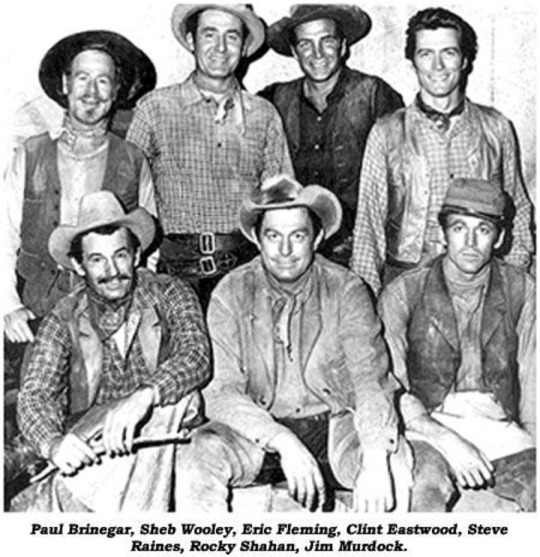
Cowboys of Rawhide
#paul brinegar#wishbone#sheb wooley#pete nolan#eric fleming#gil favor#clint eastwood#rowdy yates#steve raines#jim quince#rockey shahan#joe scarlet#james murdock#mushy#harkness mushgrove#my beautiful cowboys#cute picture#westerns#old west#cowboys#STILL MISSING JESÚS!#😤#why isn’t poor jesús ever in these portraits dang it
35 notes
·
View notes
Text
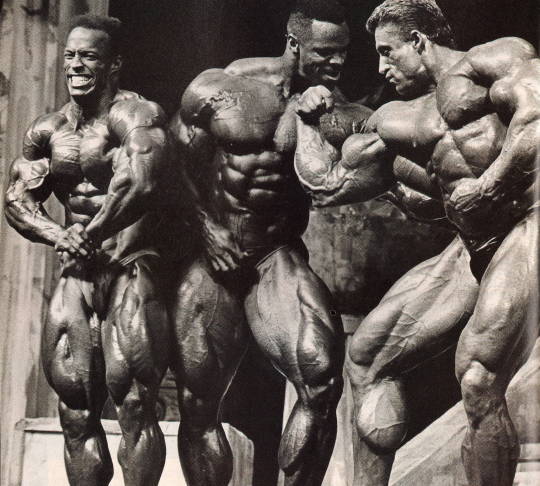
Posedown Mr. Olympia 94
36 notes
·
View notes
Text
big news (for me)
it’s 2016 again in my mind and I’m just out here writing a new Holtzbert fic, so that’s fun and good, also i just discovered the app Shuffle, where you can make collages, and so i made these wallpapers, please enjoy:
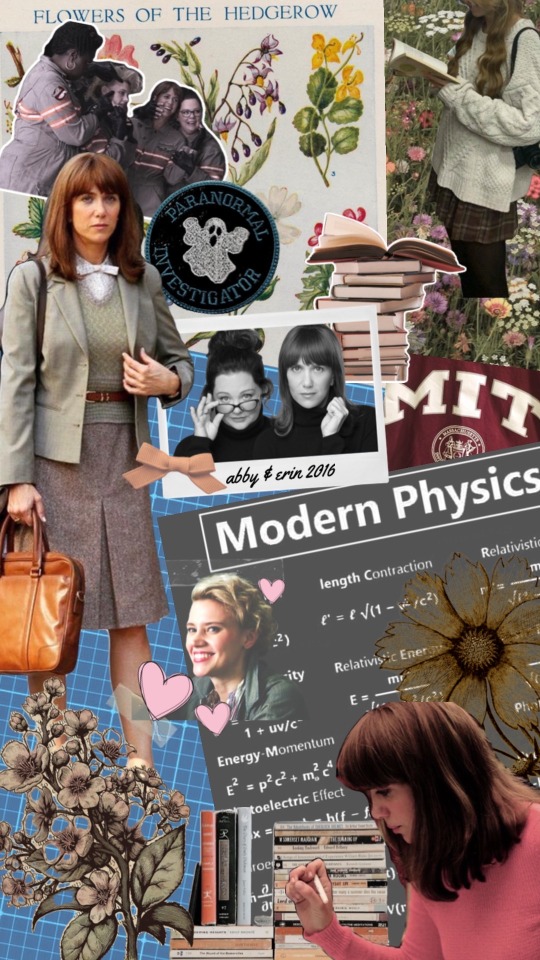
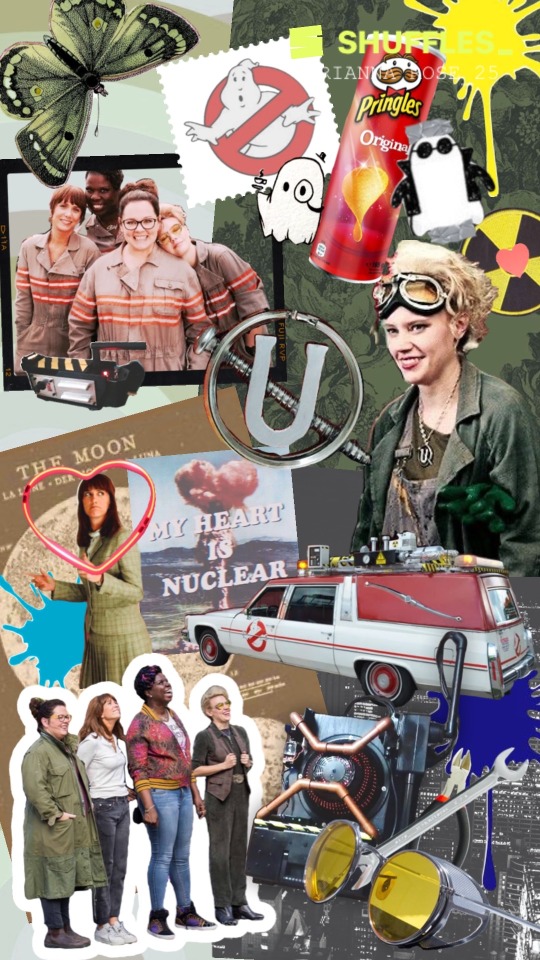
#holtzbert#erin gilbert#jillian holtzmann#ghostbusters#kate mckinnon#kristen wiig#snl#saturday night live#gay#lesbian#leslie jones#melissa mccarthy#abby yates#patty tolan#holtzmann#ghostbusters 2016#paul feig#lesbian holtz#bisexual erin#shuffle#pinterest shuffles#collage#phone wallpaper
33 notes
·
View notes
Text
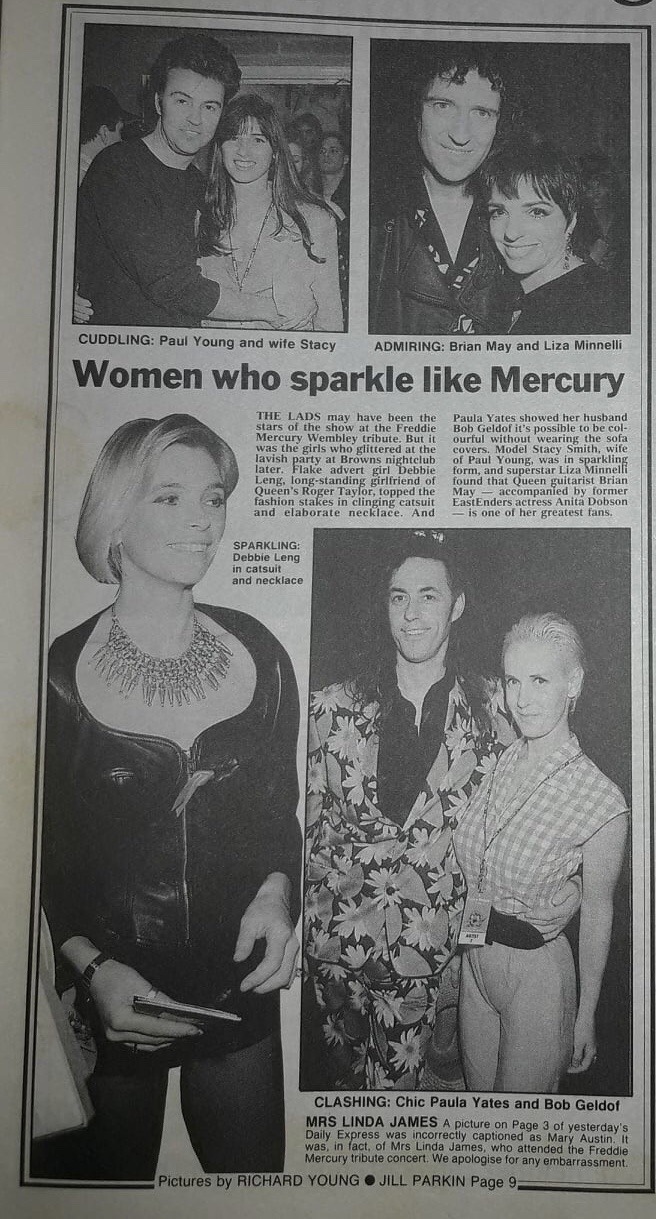
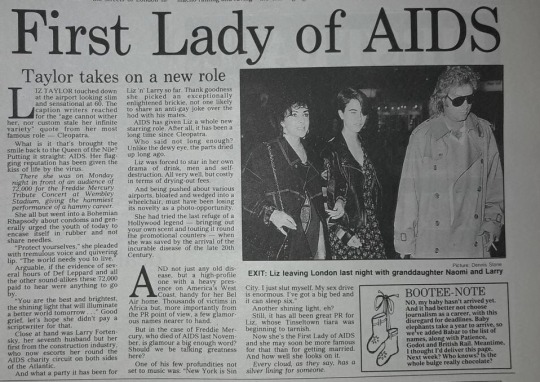
Daily Express - April 22, 1992
Credits to Roberto Macchi.
[Photo caption: CUDDLING: Paul Young and wife Stacy]
[ADMIRING: Brian May and Liza Minnelli]
Women who sparkle like Mercury
THE LADS may have been the stars of the show at the Freddie Mercury Wembley tribute. But it was the girls who glittered at the lavish party at Browns nightclub later. Flake advert girl Debbie Leng, long-standing girlfriend of Queen's Roger Taylor, topped the fashion stakes in clinging catsuit and elaborate necklace. And Paula Yates showed her husband Bob Geldof it's possible to be colourful without wearing the sofa covers. Model Stacy Smith, wife of Paul Young, was in sparkling form, and superstar Liza Minnelli found that Queen guitarist Brian May — accompanied by former EastEnders actress Anita Dobson — is one of her greatest fans.
[Photo caption: SPARKLING: Debbie Leng in catsuit and necklace]
[Photo caption: CLASHING: Chic Paula Yates and Bob Geldof]
[MRS LINDA JAMES A picture on Page 3 of yesterday's Daily Express was incorrectly captioned as Mary Austin. It was, in fact, of Mrs Linda James, who attended the Freddie Mercury tribute concert. We apologise for any embarrassment.]
[Pictures by RICHARD YOUNG • JILL PARKIN]
~~
First Lady of AIDS
Taylor takes on a new role
LIZ TAYLOR touched down at the airport looking slim and sensational at 60. The caption writers reached for the "age cannot wither her, nor custom stale her infinite variety” quote from her most famous role — Cleopatra.
What is it that's brought the smile back to the Queen of the Nile? Putting it straight: AIDS. Her flagging reputation has been given the kiss of life by the virus.
There she was on Monday night in front of an audience of 72,000 for the Freddie Mercury Tribute Concert at Wembley Stadium, giving the hammiest performance of a hammy career.
She all but went into a Bohemian Rhapsody about condoms and generally urged the youth of today to encase itself in rubber and not share needles.
"Protect yourselves," she pleaded with tremulous voice and quivering lip. "The world needs you to live.
Arguable, if the evidence of several hours of Def Leppard and all the other sound-alikes these 72,000 paid to hear were anything to go by.
“You are the best and brightest, the shining light that will illuminate a better world tomorrow…" Good grief, let's hope she didn't pay a scriptwriter for that.
Close at hand was Larry Fortensky, her seventh husband but her first from the construction industry, who now escorts her round the AIDS charity circuit on both sides of the Atlantic.
And what a party it has been for Liz ‘n’ Larry so far. Thank goodness she picked an exceptionally enlightened brickie, not one likely to share an anti-gay joke over the hod with his mates.
AIDS has given Liz a whole new starring role. After all, it has been a long time since Cleopatra.
Who said not long enough? Unlike the dewy eye, the parts dried up long ago.
Liz was forced to star in her own drama of drink, men and self-destruction. All very well, but costly in terms of drying-out fees.
And being pushed about various airports, bloated and wedged into a wheelchair, must have been losing its novelty as a photo-opportunity.
She had tried the last refuge of a Hollywood legend — bringing out your own scent and touting it round the promotional counters — when she was saved by the arrival of the incurable disease of the late 20th Century.
AND not just any old disease, but a high-profile one with a heavy presence on America's West Coast, handy for her Bel Air home. Thousands of victims in Africa but, more importantly from the PR point of view, a few glamorous names nearer to hand.
But in the case of Freddie Mercury, who died of AIDS last November, is glamour a big enough word? Should we be talking greatness here?
One of his few profundities not set to music was: "New York is Sin City. I just slut myself. My sex drive is enormous. I've got a big bed and it can sleep six."
Another shining light, eh?
Still, it has all been great PR for Liz, whose Tinseltown tiara was beginning to tarnish.
Now she's the First Lady of AIDS and she may soon be more famous for that than for getting married. And how well she looks on it.
Every cloud, as they say, has a silver lining for someone.
[Photo caption: EXIT: Liz leaving London last night with granddaughter Naomi and Larry / Picture: Dennis Stone]
#queen#queen band#freddie mercury#brian may#queen scans#daily express april 1992#paul young#liza minnelli#debbie leng#bob geldof#paula yates#elizabeth taylor
14 notes
·
View notes
Photo
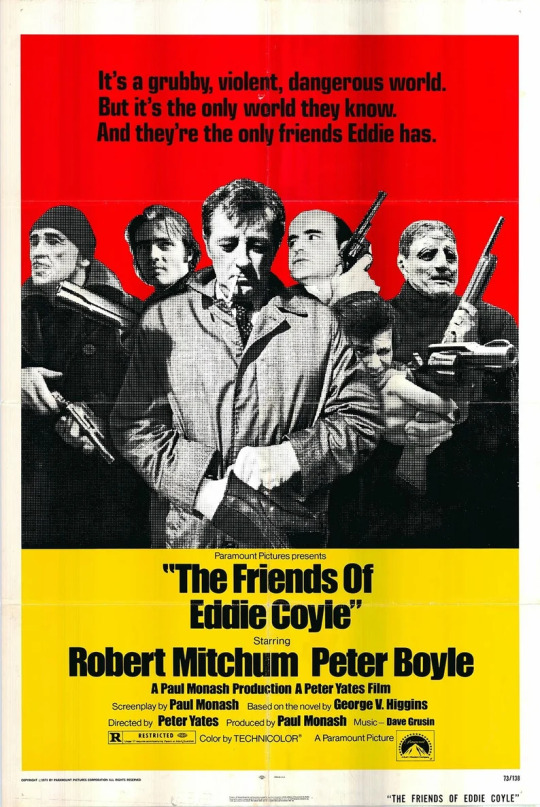
Movie #12 of 2023: The Friends of Eddie Coyle
Eddie 'Fingers' Coyle: “I shoulda known better than to trust a cop. My own goddamn mother coulda told me that.”
Dave Foley: “Everybody oughta listen to his mother.”
#the friends of eddie coyle#peter yates#crime#drama#george v. higgins#paul monash#dave grusin#victor j. kemper#pat jaffe#english#35mm#12#1973
16 notes
·
View notes
Text
Demon's Quest, Starring Tom Baker's Fourth Doctor, to be Released on Vinyl
Demon's Quest, Starring Tom Baker's Fourth #DoctorWho, to be Released on Vinyl
A new picture of Tom Baker – now 88 years old – has been released, in preparation for the release of Demon Quest, a special vinyl boxset signed by the man himself!
It is good to see Tom looking so well and proud to be still associated with his Fourth Doctor in Doctor Who – a role he last played on television over 40 years ago. (What’s that you say? He returned as The Curator in The Day of the…
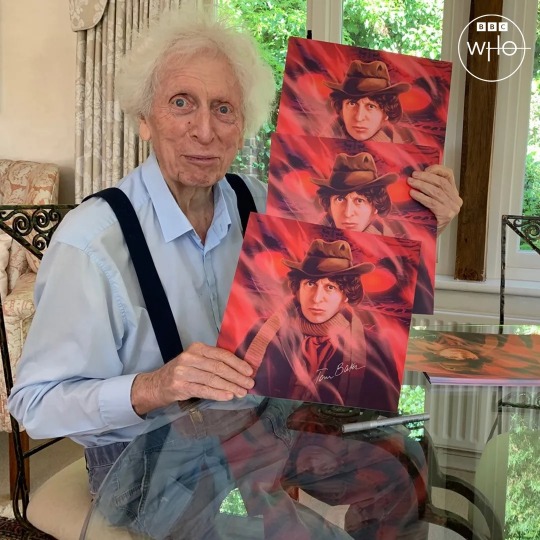
View On WordPress
#A Shard of Ice#Captain Mike Yates#Demon Quest#Fourth Doctor#Hornet&039;s Nest#Mike Yates#Paul Magrs#Richard Franklin#Sepulchre#Starfall#Susan Jameson#The Demon of Paris#The Relics of Time#Tom Baker
12 notes
·
View notes
Photo

#breaking away#dennis christopher#dennis quaid#daniel stern#jackie earle haley#barbara barrie#paul dooley#robyn douglass#peter yates#1979
13 notes
·
View notes
Text

i hope everything bad possible happens to this dude
2 notes
·
View notes
Text
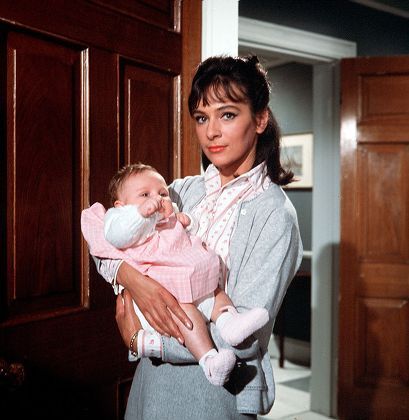



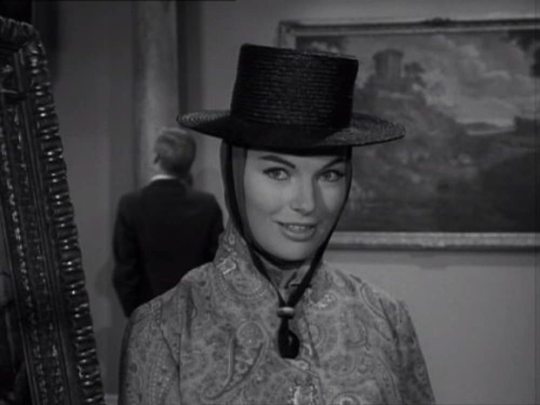
The Saint: The Damsel in Distress (3.13, ITC, 1964)
"We're finished."
"Yes, and perhaps the Saint is finished too."
"Guido, we must do something!"
"Yes! Let's go and eat."
"No! Aren't we men of courage?"
"Aren't you hungry?"
#the saint#the damsel in distress#leslie charteris#1964#itc#paul erickson#peter yates#roger moore#richard stapley#katherine woodville#paul whitsun jones#harold kasket#ivor dean#ray austin#john bluthal#camilla hasse#gwynneth tighe#hugh elton#richard wyler#i must admit that title was an immediate red flag for me‚ given the Saint's track record with sexism. and yes the pre titles bit is pretty#bad (basically just Simon slagging off his date's cooking) but after that this becomes something entirely different (if not wholly#successful). it's another slightly comic episode (thus the casting of comic actors like Kasket‚ Whitsun Jones and Bluthal) as Simon#inexplicably decides to participate in arranging a shotgun wedding. very strange; but this is also the penultimate directing job of Peter#Yates for the series‚ as he'd shortly be in high demand for proper cinema work (with Robbery in 67 and big hitter Bullitt in 68). here he's#clearly finding his feet as a director of action‚ sidelining the comedy in favour of an extraordinary fight scene between Moore and Ray#Austin (shot from a dizzying number of angles with rapid cuts) and a clearly expensive to mount car chase and plane takeoff (shot for real#and not stock footage!). oh and apparently Simon can fly a plane. he also goes undercover again using the name Sebastian (acceptable) and#doing an Italian accent (unacceptable). the ending of this episode is curious in that (unless i missed something hidden in the dialogue)#the police turn up and save the day quite by chance; interesting to know what would have gone down if they hadn't and whether Simon would#have been quite so noble in returning the key to a million pounds of stolen money..
2 notes
·
View notes
Text
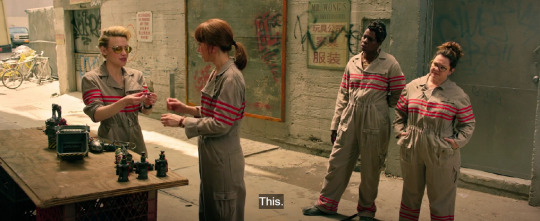
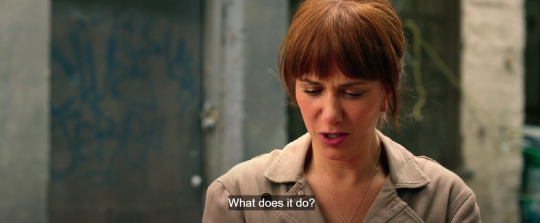
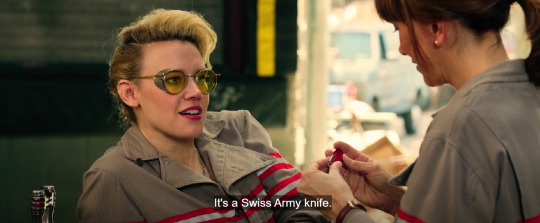

46 notes
·
View notes
Text
'Fleabag’s hot priest is about to take on his most liberating role yet: a one-man show of Chekhov’s Uncle Vanya in which he will play all nine roles, male and female. He loves taking risks, he says. It seems to be paying off…
I last saw Andrew Scott in the flesh eight years ago. I was sitting in the gloom at the top of what used to be St Martin’s School of Art in the Charing Cross Road – a tiny, temporary theatre had sprung up there – and he was three feet away from me, surrounded by great piles of stuff: newspapers, books, chairs, cupboards… a piano. The occasion was Richard Greenberg’s play The Dazzle, about two compulsive hoarders, the Collyer brothers, and his performance as one of them was mesmerising: in truth, almost too mesmerising. My mind went into overdrive. All that paper and mahogany. What if something toppled, and he was crushed – as the real Langley Collyer was – beneath a chest of drawers?
He wasn’t crushed, of course. But what’s striking and slightly odd is that today I’m seeing Scott in the flesh for the second time, and we’re again at the top of an old building – in this case, a public library – in rooms that feel a bit dilapidated, if not exactly derelict. People imagine the actor’s life to be a glamorous one, particularly if the actor in question has been in a Bond film – and of course it has its enchantments. But then there are the hours spent in spaces like this: long days of sandwiches, bottled water and elusive lines. When we came up in the ancient lift together, I couldn’t decide which of us was the more anxious. He was, I would guess. “MY TWELVE HOURS TRAPPED WITH FLEABAG STAR” ran the ticker tape in my mind as the mechanism creaked and groaned, and we each did our best not to meet the other’s eye.
Scott has spent the past three weeks here, deep in rehearsals for Vanya, a new version by Simon Stephens of Anton Chekhov’s great tragicomedy Uncle Vanya. But there’s new, and then there is… new. This adaptation gives the play, among other things, a contemporary setting. However, when the production opens in the West End, its chief novelty – and its chief draw, given Scott’s huge following – will be the fact that it is a one-man show. He will be playing all nine parts: male and female, young and old, beautiful and not-so-beautiful. It must be hard to learn so many lines, I say, once he’s (semi) comfortable on a battered leather sofa, his old, white T-shirt giving him a slight look of Marlon Brando. Doesn’t he feel like he’s going mad, with all these voices in his head? He laughs – a high-pitched, wicked laugh. “Yeah. I do, and it’s really hard [to learn]. Usually, when you can’t remember a line, another actor will say, ‘What time is it?’ or something, and then it comes to you. But now I’ve no one to cue me.” Alone on stage, he has had to change his mindset completely: “I’ve come to understand that I’m sort of looking after all these characters.”
The idea for a one-man production came about by accident. Scott, Stephens, and Sam Yates, who is directing the play, were workshopping it together (Scott has worked with Stephens twice before, most notably in Birdland at the Royal Court, in which he played a rock star who has made a Faustian pact with fame). “We miscalculated the parts, and I ended up having to act with myself, and it was kind of interesting. It gave birth to the idea that, as much as these characters say they’re different from each other, actually, some of them are very similar. I’m more interested now in those similarities than in, you know, doing a funny voice [for each one]. The production seems to me to be about what the act of creation is. I love the idea that you might be able to represent what a writer experiences on stage, all these characters in his head.”
But how on earth will the audience work out what’s going on? I understand about the funny voices, but won’t Scott have to change his a little bit when he’s acting the part of a woman? He smiles, teasingly. “I don’t think I should tell you that… But you don’t need to worry too much. I feel so liberated! I hope people will start to look at what’s within the performer so that something happens that can only really take place in a theatre – which is that you’re seeing one thing, but imagining something else.” This sounds like reading a novel, visualising scenes and characters for yourself, filling the gaps between words. He nods. “Look, I definitely don’t want to shy away from the ridiculousness of this project, and yeah, I’m nervous, but I’m loving the process. I think it’s a really sexy play. You know, Chekhov was a doctor, and he saw death so much, and I think he was able to understand human beings like no other writer.”
The argument that actors should only play who they are – that a gay character, for instance, may be played only by a gay actor – is made more and more often lately. But this production seems (to me, at least) subtly to resist the notion of identity politics in the theatre; to suggest that such rigidity may sometimes be a cul-de-sac. “It can be a cul-de-sac, certainly,” Scott says. “Of course those arguments have to be heard. The world isn’t a level playing field. But I think transformation is as important as representation. Our first understanding of storytelling happens when we’re young. Our mother or father is pretending to be a wolf. We know we’re safe, but we’re scared, too. Our parent can be a wolf! Human beings can create worlds within themselves. I don’t think we can just slice that out of ourselves.”
He knows some will heartily dislike this Vanya, but the thought seems, if anything, to excite him. “It could go wrong,” he says. “But we need a bit more of people not liking things.” He’s ambivalent, to put it mildly, about standing ovations, which seem to happen in the theatre most evenings nowadays. “My concern is that everything becomes meaningless. I think it’s unfortunate that if someone decides not to stand up, it’s perceived that they hated it. That’s not necessarily true. Maybe I thought it was very good, but I didn’t feel like rising to my feet. My producers are going to hate me for saying this, but I strongly believe that if people don’t feel like standing up, they shouldn’t. People feel lonely, having to stand when they don’t want to. Equally, it’s kind of moving when most people are not standing up, and three people are.”
Does he blame the internet for this? Is it just another form of “liking” something? “I do blame the internet, yes.” But perhaps, too, it has to do with cost. “I was recently on Broadway, and tickets there are astronomically expensive, and I thought: well, these people have to stand up because they’ve spent $390, so it’s got to have been one of the best nights of their lives.” Either way, he doesn’t understand it: the firmness and immediacy of people’s responses. “When you’ve just seen a play, it’s a really sensitive time. It’s weird when people start talking straight away about their new conservatory.” All this may explain why he feels there is more value for him in doing experimental work. “Some people will like it, some people won’t, and that’s great. I feel ferocious about wanting to take risks.”
In the coming months, Scott will be everywhere: a trick of scheduling, rather than by design. Vanya will be followed in January by the release of All of Us Strangers, a film in which he stars with Paul Mescal and Claire Foy (he plays a depressed screenwriter who goes to visit his childhood home, only to find that his parents, far from having died in a car crash when he was 12, are alive and well – though much of the coverage of the movie so far has focused on the fact that his character and Mescal’s are lovers). “It’s a beautiful film,” he says, dreamily. And then there’s Ripley, a Netflix series (its release is expected at the end of this year), based on Patricia Highsmith’s novel The Talented Mr Ripley, written and directed by Steven Zaillian, the screenwriter of Schindler’s List and Hannibal.
“It’s a big, big thing,” he says, of his role as Tom Ripley, grifter and serial killer. And yet, Scott said he wouldn’t be doing any more crazed sociopaths, having played Moriarty in Sherlock (he was also a baddie in the Bond film Spectre). “I know, but what I find interesting about him is not the psycho-ness; it’s the otherness. To me, it’s about what it’s like never to be invited to the party. We all know people who don’t make it easy for themselves, who are maybe a bit strange. But if you’re constantly ignored, or sidelined, or don’t fit in, what happens? Is it that something dark emerges? I don’t mind saying that playing him was challenging. It was very lonely. We filmed during Covid, and the five-day isolation requirements that were in place both here and in Italy meant people couldn’t come and visit, and I couldn’t come home. It’s eight hours of television, and he’s a solitary figure in this version, so I was on my own a lot.”
Scott is 46, though you wouldn’t know it; his enthusiasm, like his fidgetiness, belong to a younger man. He grew up in Dublin, with his two sisters – his father worked at an employment agency; his mother was an art teacher – where he was educated at private Jesuit school, attending drama classes on Saturdays. Art was his first plan – painting is still his great love; he can’t wait for the forthcoming Hockney show at the National Portrait Gallery – and he won a bursary to art school at 17. But then he was cast in a film, Korea, about an Irish boy emigrating to America in the 1950s who’s enlisted to fight in the Korean war, so he turned the place down, and once the movie was done, went to Trinity College to study drama instead. After six months, bored by the course, he left to join Dublin’s Abbey theatre.
He seems hardly ever to have been out of work, and his CV is such a mixture: Gethin the tense gay Welshman in Matthew Warchus’s film Pride; eccentric Lord Merlin in the BBC adaptation of The Pursuit of Love; an acclaimed Hamlet in 2017 at the Almeida theatre. By this point, his mantlepiece – he has two, one in London, and one in Dublin – must be quite frantic with statuettes (his most recent win, in 2020, was a Laurence Olivier award for best actor for his performance as Garry Essendine in Noël Coward’s Present Laughter). Does he feel blessed? “Yes, and that’s a really nice way of putting it. I’m grateful.” But perhaps this sounds too… humble: “I’ve never understood why there’s some sort of shame associated with being an artist. I feel able to call myself one.”
His fame is at a level that means he can move around London unnoticed, and he’d like to keep it that way. “I’m suspicious of it. I’ve no real interest in the value of it. The idea of being followed by a photographer seems hellish to me.” Does it affect his relationships? He doesn’t believe that it does, though there are “creepy, unsavoury people” out there who might not “have my best interests at heart”. Is he single? “Yes, I am.” Would he like to meet someone? He would. Surely it’s easy in his world? So many lovely new people entering his orbit all the time – and with his looks… He laughs. “That’s a lot of projection, there,” he says, sounding suddenly more Irish.
I read somewhere that some women in Ireland will always think of him as the guy who turned up to their demonstrations in the run-up to the abortion referendum in 2018, even when it was raining (the vote overturned the ban on abortion in the country, and followed one of 2015, which allowed same sex couples to marry). Isn’t it amazing how much Ireland has changed? When he was 16, it was still illegal to be gay, as he is. “Yes, it’s immense for people of my generation to have been emancipated from the shame of the Catholic church. But it’s interesting. Privacy matters to me, but then I remember Sinéad O’Connor being on The Late, Late Show, talking about human rights, and how important that was. Her kindness… We’re only just finding out about it. She didn’t announce it to the world. Again, it brings us back to social media. Does kindness happen if you don’t tell everybody about it?”
Scott is no longer a practising Catholic. But he can’t be certain this means he won’t call for the priest at the end (this conversation has taken a morbid turn, and it’s my fault). Perhaps it’s in the marrow. “It’s the organisation that’s the problem, not the principles behind it, which are very beautiful for the most part. I remember when Simon and I were doing [the play] Sea Wall. One of the lines in it is: show me God, where is he? And then the next line is: well, show me love, where is that? You can’t get evidence for either of them really. They’re just strong feelings. I believe in the power of love. I feel it’s stronger than anything, because you can’t do anything about it. I’ve so much of it in my life, and one of the things I’m most proud of is how much I’m able, not only to receive it, but to give it – and if somebody thinks that’s sentimental or mawkish, well, to me it’s the opposite.” He talks for a while in this vein. “I want to try to be a good person; not just a nice person, but a good person,” he says, his voice racing on – and it makes me think of him as the Hot Priest in Phoebe Waller-Bridge’s Fleabag, the role for which he may now be best known. If every pulpit came with an Andrew Scott, our churches would be bulging at the seams.
Soon after this, there’s a knock on the door. It’s time to begin rehearsal (in the hall outside, his director stands at a lectern, looking quite priestly himself). He has, he says, another three weeks to go before Vanya opens, and when it does, he’ll be looking out for me; I’d better be sitting down at the curtain call, he jokes. Well, perhaps I’ll have good reason to be sitting down, I joke back. But he’s ever serious: “I always remember what my mum used to say. She’s an art teacher, and she used to tell us that a good drawer never rubs out. So, you draw a line, and then you get it wrong, and then you start a new line. The fact that people can see your old line doesn’t make them appreciate your new line any less. It may even make them appreciate it more.” What he means, I think, is that he believes it’ll be all right on the night.'
#Andrew Scott#Fleabag#Vanya#Ripley#The Dazzle#Anton Chekhov#Uncle Vanya#Simon Stephens#Sam Yates#Birdland#All of Us Strangers#Paul Mescal#Claire Foy#Jamie Bell#The Talented Mr Ripley#Patricia Highsmith#Steven Zaillian#Moriarty#Sherlock#Spectre#Pride#Lord Merlin#The Pursuit of Love#Hamlet#Almeida Theatre#Noel Coward#Present Laughter#Olivier Awards#Sea Wall#Phoebe Waller-Bridge
17 notes
·
View notes
Text
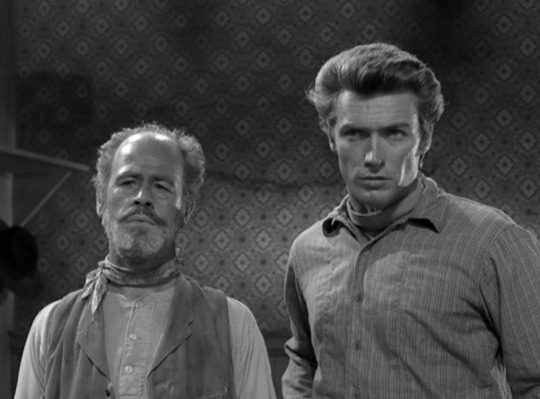
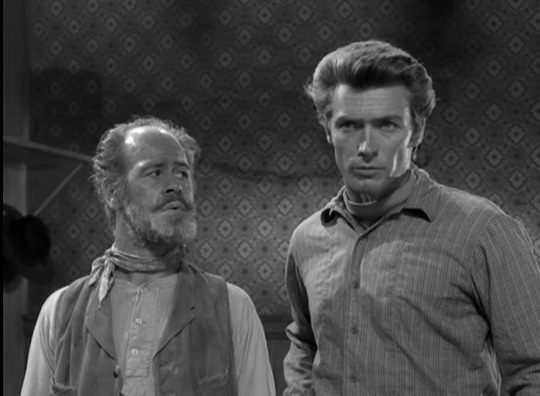
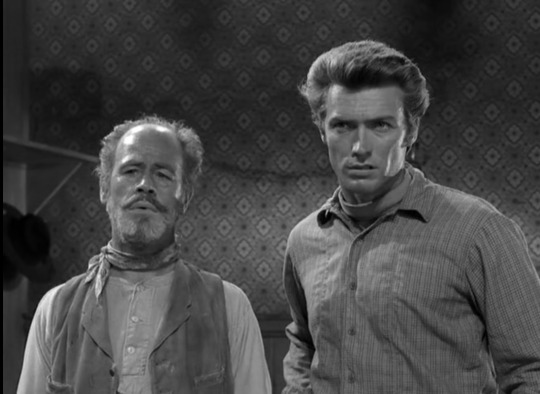
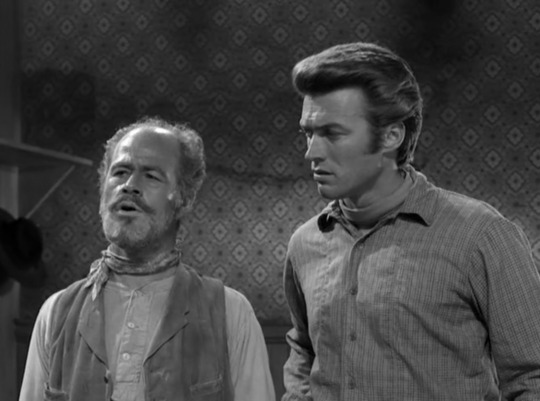
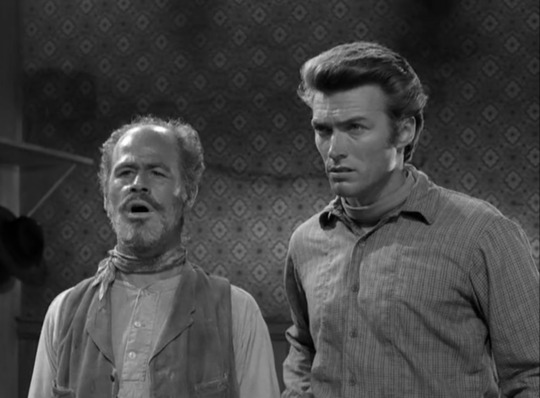
Rowdy and Wishbone in S2E6 Incident of the 13th Man (1959-10-23)
#rowdy yates#wishbone#G W Wishbone heheh#paul brinegar#clint eastwood#rawhide#westerns#classic western#cowboy#cowboys
10 notes
·
View notes
Text

Mr. Olympia 94
16 notes
·
View notes
Text
Director Bert I. Gordon finally makes an appearance on the podcast with TORMENTED (1960)! Taking a break from his "Thing Big" schtick, Gordon takes on a ghost story that stars Richard Carlson, Juli Reding and Susan Gordon.
Context setting 00:00; Synopsis 21:16; Discussion 34:28; Ranking 50:42
#horror#podcast#bert i gordon#thing big#tormented#richard carlson#susan gordon#lugene sanders#juli reding#joe turkel#lillian adams#gene roth#vera marsh#harry fleer#paul frees#george worthing yates#ernest laszlo#john bushelman#albert glasser#calvin jackson#allied artists#SoundCloud
1 note
·
View note